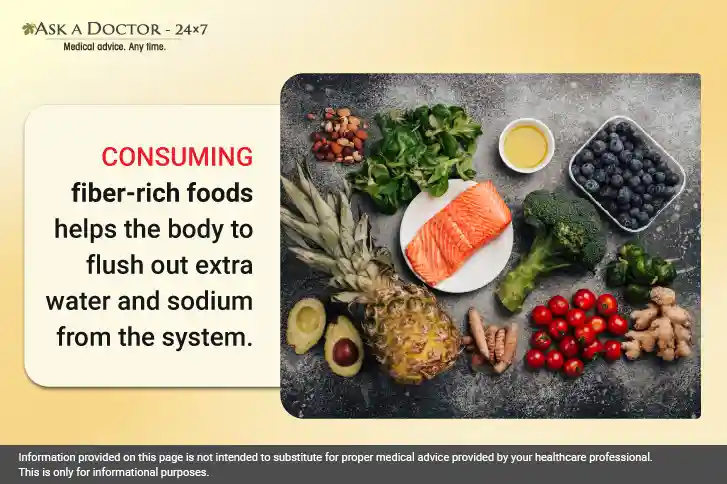What Is Water-induced Inflammation And Ways To Reduce It
Why donŌĆÖt my shoes fit? Why I am feeling my finger ring so tight today? Well, It may be due to water retention or water-induced inflammation. Water is essential for life. A large portion of the body is made up of water, which is vital for cell function and life. Without sufficient hydration, the body struggles to flush out toxins, lubricate joints, and regulate body temperature. Drinking sufficient water every day is important for your health.
But thereŌĆÖs a catch - what happens when the body stores excess water in various tissues? Read on the blog to know in detail...
What is Water-Induced Inflammation?
Water-induced inflammation refers to fluid buildup in body tissues such as legs, ankles, feet, face, and hands. Healthy kidneys can excrete approximately 800 milliliters to one liter of fluid water (0.84ŌĆō1.04 quarts) per hour. Inflammation occurs when the body experiences difficulty in eliminating excess fluid resulting in an imbalance.
Excess fluid buildup irritates tissues and disrupts electrolyte balance, especially a decrease in sodium levels in the blood leading to:
- Fluid retention
- Water intoxication or poisoning
- Swelling in brain cells, causing confusion, drowsiness, and headaches
What are the Causes of Water-induced inflammation?
Water-induced inflammation has many causes, including consuming too much salt, being sedentary for a long time, being overweight, drinking too much water in one go, hormonal fluctuations, or some chronic health issues such as chronic kidney disease, congestive heart failure, lymphatic dysfunction, uncontrolled diabetes, malnutrition and side effects of certain medicines such as contraceptives and corticosteroids.
Water-induced inflammation is common among marathon runners, and soldiers who drink large quantities of water in a short period. Symptoms of water-induced inflammation are vague and manifest as:
- Swelling, puffiness, and pain in affected body parts (feet, ankles, and hands are commonly affected)
- Joint stiffness
- Shiny and tight skin
- Feeling of heaviness and less nimble or active
- Weight fluctuations
- Skin does not bounce back on pressing for a few seconds(pitting edema)
- Swelling in brain cells causes mass effects leading to neurological problems
How To Reduce Water-Induced Inflammation?

If you do not have an underlying health condition you may be able to relieve water-induced inflammation and promote fluid balance by making dietary and lifestyle changes. Maintain a diary of your daily activities and eating when you feel like retaining extra water in your body. This will help in making appropriate changes. Seek a doctorŌĆÖs help if the problem persists.
Here are 14 smart tips to get rid of water-induced weight:
- Low salt diet: Limit your intake of salt to no more than 2300 mg per day. Avoid sodium-rich foods especially packaged foods, salty snacks, and canned foods to cut down sodium intake. Look for labels such as ŌĆ£low sodium,ŌĆØ ŌĆ£reduced sodium,ŌĆØ or ŌĆ£no salt addedŌĆØ in packaged foods.
- Drink more water. It may seem counterintuitive but drinking water improves kidney function, allowing excess water and sodium to be flushed out of the body.
- Add turmeric to your diet. Turmeric contains curcumin, a compound with potent anti-inflammatory properties. It can be consumed as a spice or taken as a supplement.
- Eat more ginger. Ginger contains gingerol, which helps in reducing inflammation by blocking inflammatory pathways. You can add ginger to your meals or brew it as tea.
- Say yes to leafy green vegetables. Leafy greens such as spinach and kale are rich in antioxidants, phytonutrients, and minerals and help in reducing inflammation and boosting overall health.
- Eat protein-rich foods. Foods rich in protein like eggs, lean meats, pulses, soy products, seafood, and seeds must be included in a healthy diet. They have anti-inflammatory effects and can help reduce water-induced inflammation.
- Limit your intake of refined carbs. Refined carbs such as white bread, rice, or pasta cause the body to store extra water. Cutting down on carbs is a quick way to use up the glycogen stores and relieve inflammation.
- Eat more berries and tomatoes. Berries such as blueberries and strawberries are packed with antioxidants called anthocyanin and tomatoes with lycopene. These compounds reduce inflammation in the body. Enjoy them as a snack, in smoothies, or as toppings.
- Add extra virgin olive oil to your diet. Extra virgin olive oil can be used as a dressing or for cooking. It contains oleocanthal, a compound with anti-inflammatory properties.
- Increase magnesium and potassium intake. Foods rich in magnesium and potassium balance your sodium levels and decrease water retention in the body such as bananas, avocados, nuts, whole grains, sweet potatoes, and spinach. It is also available as a supplement.
- Get more of vitamin B6. Vitamin B6 or pyridoxine is a water-soluble vitamin that regulates fluid balance and reduces water retention. Good sources of vitamin B6 include milk, avocado, salmon, eggs, carrots, and spinach.
- Keep your feet elevated. Lie down with your legs higher than your head or sit with your legs above the heart level to improve blood flow and reduce swelling and pressure in your legs.
- Wear compression stockings or leggings. Specialized socks apply gentle pressure to your legs helping to decrease extra fluid in the legs, and reduce swelling and pain.
- Move more. Avoid sitting or standing still for too long. Move around more often to sweat out extra water. A workout improves blood circulation.
Remember water-induced inflammation can be effectively mitigated proactively. However, sometimes inflammation can be a sign of an underlying health condition, particularly if it's severe or comes suddenly. It is important to consult a doctor.
To learn more about water-induced inflammation, Ask a General Physician at Ask a Doctor 24x7 online or contact your healthcare provider.
Recently Answered Questions Related to Water Inflammation and Weight Management
- Does Water Retention Cause Weight Gain?
- Suggest Treatment For Water Retention In Body
- Does Grape Water Help In Losing Weight?
- Is Warm Water With Lemon Effective In Weight Loss?
- How To Reduce Weight And Water Retention?
- How To Lose Water Weight In Body?
- What Causes Water Retention In The Body?
- Is Water Fasting Good For Health And Weight Loss?
- Can Fibromyalgia Cause Inflammation In The Joints And Muscles?
- What Is Inflammation On the Back Of the Hand Suggestive Of?
Disclaimer: Information provided on this page is not intended to substitute for proper medical advice provided by your healthcare professional. This is only for informational purposes.
Ask a Specialist
Recent Questions


